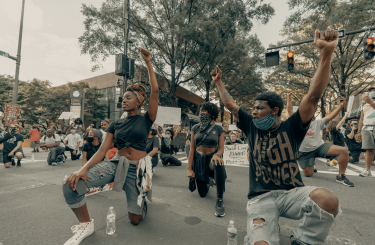Related



Over August, we brought our members together to reflect informally and in-person across London’s parks on funder practice, how we take forward the lessons learnt from the pandemic and how funders can best support civil society and communities through recovery.
Here’s what we learned...
The pandemic saw an unprecedented level of funder collaboration, there was a sense of urgency about supporting the sector to deliver services to those hit hardest by the pandemic. We heard from funders that they offered more flexibility to grantees by trusting them to know how to deliver for their communities.
Isn’t now a good time as any to build on the collaboration and appetite for risk shown by funders during the pandemic?
Part of the reason for this was that everyone had a common understanding and a common vision for what was needed - it was about helping those most in need, as soon as possible. But as we discussed with funders, why can’t we have that same sense of urgency when there isn’t an immediate crisis? With rising structural inequalities, increased physical and mental health issues and scientists warning we need to take urgent action to tackle the climate crisis - isn’t now a good time as any to build on the collaboration and appetite for risk shown by funders during the pandemic?
The “We Stand with the Sector” statement coordinated by London Funders was signed by over 400 funders who all pledged to support civil society groups through the crisis. It committed funders to offer financial flexibility, adapting activities, listening, and not adding pressure on organisations to meet tight reporting deadlines.
Funders we spoke to said this contributed to a culture shift within the funding sector - moving away from burdensome application and evaluation processes to a more open, relational, and trusting approach. Maintaining that flexibility and trust was something funders said they’d put on their “wish list” for future working. Indeed, more funders are signing up to IVAR’s flexible funding commitments, which includes accepting risk, acting with urgency and providing feedback to unsuccessful applicants.
How big is the gap in provision? What services do funders need to support?
The challenge now is moving away from the urgent response the pandemic required to thinking ahead. How do we do this when there still a culture of meeting short-term needs? The sector also needs to look at whether we missed the most vulnerable who couldn’t cope with online service delivery. How big is the gap in provision? What services do funders need to support? And another slightly more controversial question asked was ‘which services shouldn’t come back’? Arguably the pandemic exposed to funders that some charities’ work is no longer relevant.
So how do funders and civil society groups think about responding not only to those immediate needs but making long-term plans at the same time? We heard from funders that this is as much about building capacity within organisations to do that thinking but it is also about sharing learning with each other. A key example of this is the short-term food supply provided by groups during the pandemic - can we move to doing long-term food co-op models for example?
Funders also discussed the conflict between funding policy, advocacy and movements versus supporting direct service delivery. The pandemic has made clear that there is much to be done to make sure that everyone has good opportunities and fair health provision. Arguably increasing funding for campaigning could have more longer term benefits than supporting the day-to-day work of some charities.
Speaking of long-term, the government’s ‘levelling up’ agenda could be a key vehicle for civil society to look ahead. Currently there is a lack of certainty about what this agenda means practically, and we are hoping that the White Paper on ‘levelling up’ and upcoming spending reviews will provide an opportunity to occupy that space and setting out a vision for what ‘levelling up’ really means.


